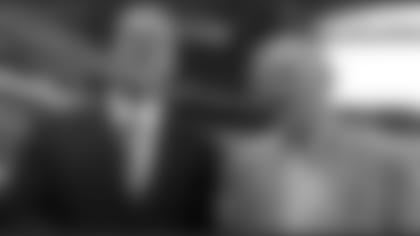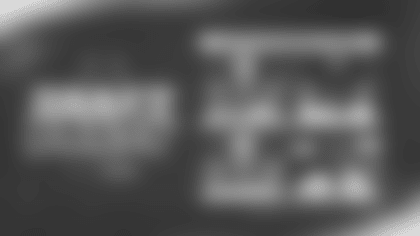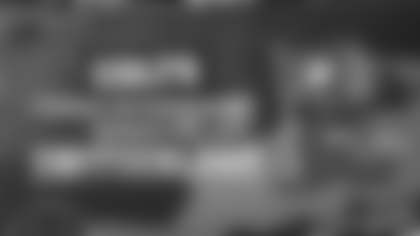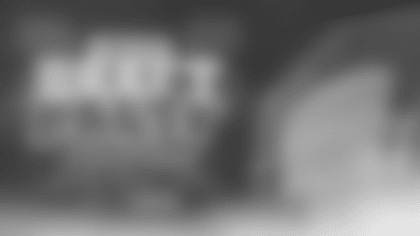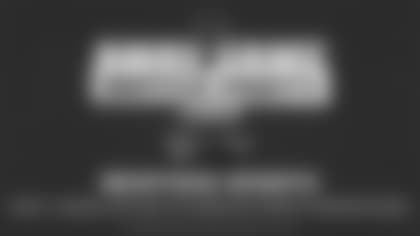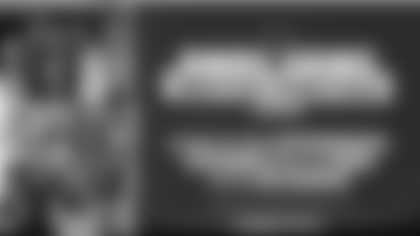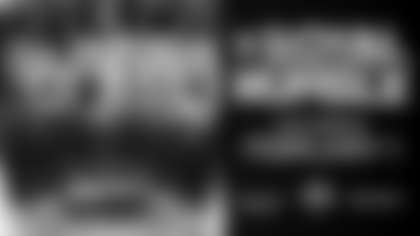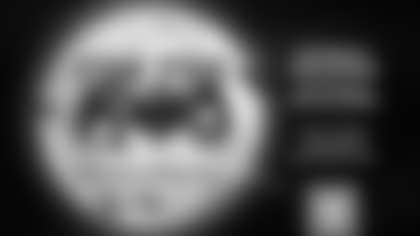Bill Polian, in his 12th season as Colts president, has a resume
unique in the NFL. One of two men to win NFL Executive of the Year
five times, Polian in the 1980s built the Buffalo Bills into a
four-time Super Bowl participant. In the mid-1990s, he built the
expansion Carolina Panthers into a team that made the NFC
Championship Game in its second season, 1996. Since joining
Indianapolis in 1998, he built the Colts from a 3-13 team in 1997
and 1998 into one that has made the playoffs 10 of the last 11
seasons, including an AFC Championship Game appearance after the
2003 and 2006 seasons, AFC South titles in 2003, 2004, 2005, 2006
and 2007 and a Super Bowl championship following the 2006 season.
Each week during the season, in The Polian Corner, Polian and
Colts.com will discuss issues pertinent to the Colts and the rest
of the NFL.
**
* *Question: A 27-23 victory over the Miami Dolphins at Land Shark Stadium in South Florida Monday night. It appeared Colts quarterback Peyton Manning took over the game in the fourth quarter.**
**
Answer: I don't think Peyton took over the game in
the fourth quarter. Our offense functioned very well from start to
finish. We averaged more than five yards a rush. Obviously, we
threw the ball very well. He had an astronomical passer rating. So,
from start to finish, our offense was in high gear – from the
very first play of the game. We just didn't possess the ball
enough to score more than 27 points. But that turned out to be
enough. I think we had one empty possession the whole game. The
sack led to an empty possession in the third quarter after our
defense did a good job getting them off the field. But that's
the way it goes when you play teams like that. We've seen
this all before. It's of little consequence. It's not
cosmic. The world isn't ending because they possessed the
ball for 80 plays. That's the way people want to play us and
in the end, we won the game. As our friend with the (New York) Jets
(former Head Coach Herman Edwards) said, 'You play to win the
game.' That's the bottom line. What happened? We won
the game.
*Q: Did you see anything on tape you didn't see live?
*A: Yes and no. We play to a standard of performance every week. Our concern is No. 1, win the game. That's most important. Secondly, we have a standard of performance for each unit. For the offense, it was quite high. They met their standard of performance. No question about that. For the defense, they came nowhere near reaching their standard of performance. For the special teams, it was a bit of a standoff, although Pat McAfee did a really good job both kicking off and punting. Call it a standoff. We didn't return the kickoffs quite as well as we should have. Their kicker didn't kick quite as well as Pat did and we didn't make any headway there, so call that a standoff. We did not meet our standard of performance with a glowing report. On special teams, we can do better than we did. On defense, we did not meet our standard of performance by a long shot. Nowhere near close. We were playing too high on the defensive line. We had far too many missed tackles. We had far too many poor entries in terms of gap control and things of that nature. We have lots and lots of work to do to get better on defense and get better specifically against the Wildcat and the kinds of things that people are going to do us. As far as the game plan and how the game was played, they played to their strengths and we played to our strengths. We won the game.
Q: Was there a turning point?
A: The field goal before the half was big. That was a great performance by the offense and a great kick (a 48-yard field goal) by Adam (Vinatieri). And then the winning touchdown drive was big. Then, of course, the defense did a great job playing victory defense – keeping them in bounds, keeping the clock running, doing what they had to do to keep them out of the end zone. (Rookie cornerback Jacob) Lacey did a terrific job on the one play that did get into the end zone (deflecting a pass intended for wide receiver Ted Ginn, Jr.). Of the defensive group, I thought the secondary played the best. That showed up in the passing game, but as far as the running game was concerned, we did a very poor job there.
Q: Discuss the Wildcat. Is that the same Wildcat they ran last year when they were so effective?
A: What they do with (reserve quarterback) Pat White is slightly different than what they do with (running back) Ronnie Brown. They're very creative. They ran some 'A' formation, too, with three backs in there. (Dolphins Offensive Coordinator) Dan Henning dug that one out of the 1950s playbook. He is, as I said last week, the most creative offensive coordinator in football. They did some different things. They blocked it basically the same, but he did what every creative offensive coordinator does. He confused us with motion, with looks, with criss-crosses in the backfield – with all the kinds of things old-time Wing T and Single-Wing football did. He and I are both old enough to remember it, as is Coach (Bill) Parcells (the team's executive vice president of football operations). We played very, very poorly in terms of recognition of those kinds of things.
Q: You're 2-0 and ahead in the division. A different feeling than last season?
A: If you drew it up perfectly, you'd say, 'Yeah, this is great,' but it really means very little. All it means is we won two games, 'Let's get the next one under our belt.' We have to go play that on a short week. The schedule-maker was not kind to us. I think in this decade only three teams have had to go back-to-back, prime time on the road, and this is now our second time. Somebody up there doesn't like us, but in any event, the bottom line is we've won two games and that's great. There are 14 more to go, so let's get on to the next one.
Q: What does that do to the following week?
A: It makes it very difficult to practice, especially given the kind of game it was. You have defensive guys who may not be up to practicing until Friday, perhaps, so you have to absorb a game-plan mentally. Now, I personally believe based on my experience that that can be a good thing. Sometimes when you play the number of plays we played in the weather conditions in which we played, it's better to give them a little time off – let their bodies rest, take it easy. So, the guys who are banged up, we'll probably take it a little bit easy with. I know that (Colts Head Coach) Jim (Caldwell) is planning on ratcheting things down a bit, so I think we'll get through the week OK. It's not easy, but that's the National Football League.
Q: And it seemed that conditioning was a factor Monday . . .
A: We were in great condition to play in that kind of circumstance in that type of a game. Our guys hung in very well. We didn't reach our standard of performance on defense, but the effort and the fight and the courage to hang in there in the face of all that adversity – some of it was self-created and I forgot to mention the penalties; you're not going to win very many games when you don't get off the field three times when you should because of offsides penalties – but the bottom line is they fought like the devil and their conditioning is really good. They hung in in a very, very difficult circumstance.
Q: A lot of young guys had big games, too . . .
A: (Running back) Donald Brown had a great night and (wide receiver) Austin Collie had a great night. (Wide receiver) Pierre (Garcon) had a great night. Jacob Lacey did a great job coming off the bench when (veteran) cornerback Kelvin Hayden went down. He's an undrafted free agent, but he played that way all preseason. I thought he did a terrific job. It was a great performance, and he made a key play that helped win the game. That's what you have to have: 'Next Man Up.' When you get injuries, the next guy has to step up and play.
Q: And really difficult weather conditions . . .
A: I thought we were a little fresher at the end than they were. That's always an impression, but I thought that was the case. It certainly helped in terms of being able to hang in there and make the plays at the end that it took to win. (Former Colts Head Coach) Tony (Dungy) was always fond of saying it and Jim has repeated it with the team that the vast majority of games in the National Football League come down to the last two minutes. That's what this game did. We were able to make the plays necessary to win.
Q: How come the Colts never brought safeties up to stop the Wildcat? And what was wrong with cornerback Marlin Jackson?
A: There was nothing wrong with Marlin. He played in all the nickel situations and actually played on a couple of special teams. He's coming off a very serious knee injury and he's about two months ahead of schedule in terms of playing, so he's not carrying a full load. We'll actually ramp that up over time. He was fine and played well. In terms of bringing the safeties up, we actually did. We went back to our old safety-up kind of defense – the eight-man front look, the so-called 'eight in the box' – and it didn't do much good, because the conception of the Wildcat was causing us to get out of the gaps we should have been in. We ended up peaking at the ball instead of staying low and getting in our gaps and stacking stuff up. That's something we're going to have to work on and practice and do a better job of.
Q: If you don't go in pads, can you get that kind of work done this week?
A: I don't know that Jim's going to take them out of pads necessarily. But you can, sure – it's a matter of simply working on technique. The thing with the Wildcat, it's like any misdirection offense or any misdirection play – you cannot look in the backfield. The line blocking will take you to the play. You cannot look in the backfield. If you look in the backfield two things happen: A, you get frozen, which happened to our linebackers on more than a few occasions; and, B, you get beaten to the punch and that's what was happening. (Dolphins running back) Ronnie Brown was coming downhill. To our credit, we were fighting hard. We were coming off blocks and we were entering. But we were entering late. Instead of getting two yards, he was getting five because he was running downhill with his pads down blasting away, much like Donald did. That you have to get corrected, but yes, you can do it without pads, because it's just a matter of technique.
Q: Can you talk about the offensive line in general and in particular, Charlie Johnson-Tony Ugoh? How is Ugoh coming along?
A: (Guard) Mike Pollak and (center) Jeff Saturday made two key blocks on (wide receiver) Pierre (Garcon's) touchdown reception and run. Again, a team effort, high standard – they met it, no question. Charlie has played well (at left tackle). Tony is getting better. His knee gets balky from time to time, which limits, to some degree, his practice, but he was OK for the ballgame Sunday night. Barring injury, I think we'll stay with the rotation we have now. As you know, this is a long season and you can have injuries. You do have injuries every week, so everyone on the team has to be ready to go and step in and be able to do the job.
Q: In the Wildcat formation, when Brown takes a direct snap and is tackled behind the line of scrimmage, is that considered a sack?
A: I don't know the answer. I don't know how they treat the running back in a wildcat formation. This is a statistical issue that is governed by the Elias Sports Bureau. The Elias Sports Bureau is based in New York. I've only met somebody from the Elias Sports Bureau once in my life, actually. They make these distinctions, but my guess would be that if the guy's position is running back they would not consider it a sack unless he were attempting to pass. If it's a normal running play and he's thrown for a loss, I think they would treat that as a tackle for a loss. We'll call the ever-elusive Elias Sports Bureau and find out how they treat it. That's the question, 'Would it change if Pat White is back there?' I don't know how they treat it. I'm far more concerned about how you handle the misdirection. Here's a brief thing about possession time. I've said this more than a few times, and I suspect I'll say it again and again before my time here is up. The most overrated and meaningless statistic in football is time of possession. It has absolutely nothing to do with anything. It has nothing to do with winning the game. There is no statistical correlation between time of possession and winning the game, absolutely none. It's just something that people can talk about. Does it affect physical conditioning in a ballgame such as Sunday night? You can make two arguments. One is that it might if you are in a passing game, because the defensive backs are running a long way and the rush men have to rush the passer, which is very fatiguing and very debilitating. You can make the argument that in a run game it's less important, although you do take some lumps over the course of a ballgame. But from a statistical standpoint, it has no meaning whatsoever.
Q: Did the Miami Dolphins' center seem overactive before the snap, and that did lead to some of the offsides penalties? He seemed to be head-bobbing before the snap? Is that legal?
A: Like everything else in the National Football League, when it comes to the rules it depends not on the rule but on the interpretation. If you read the rulebook, it is not legal. From an interpretation standpoint, which is what really happens on the field, if that is what he does in the normal course of events – in his case, quick headsnap, then snap the ball – then they don't call it. That's what he does. That's what you study on film. Jake Grove is one of the best centers in the league. We have not seen a lot of him because we only played the (Oakland) Raiders once, so it's not like we're familiar with him the way you would be the people of Jacksonville, or Tennessee, or Houston. But the fact is that's his normal way of snapping the ball. Their quarterback (Chad Pennington) is notorious for being a great hard-counter, although we had some offsides versus the Wildcat. He got us on a 3rd-and-11 that was very hurtful. We were off the field. You have to be cognizant of that. That's part of being prepared to play the game and part of meeting the standard of performance we have here. We did not meet that. Those are self-inflicted wounds – gifts, as (Hall of Fame Head Coach) Marv Levy used to call them. You can't win very many games when you give the other team gifts.
Q: Why didn't Jim Caldwell challenge on the Dolphins' first touchdown? It appeared the runner was downed a half a yard short.
A: He didn't, actually. It's the placement of the ball when the runner hits the ground. If you looked at the second angle, not the first, which of course the referee would have seen, clearly he was in. It has to be incontrovertible visual evidence to change a call on the field. The call on the field was touchdown and it made little sense to use a challenge at this point.
Q: How important was the interception by the Dolphins that was overturned late in the first half?
A: A big play – and the right call. You could make the argument very strongly that (wide receiver) Reggie (Wayne) was interfered with on that play. I can't think of another instance where I thought there was a replay issue. I was seeing the television feed, which admittedly was choppy as to replay. You didn't get as many as you wanted and as many as you thought you should within the time frame necessary to challenge, and that's really up to the (television) producer.
Q: The Arizona Cardinals are next. They don't run the Wildcat, do they?
A: (Laughing) Not that I know of. They're in the shotgun a lot with (quarterback) Kurt Warner and the three great receivers that they have. They do run the 3-4 defense. They're a little more of a blitzing defense – sort of a Pittsburgh-style defense, which makes sense because (Head Coach) Ken Whisenhunt was there and feels very much at home with that system. But the key there is (quarterback) Kurt Warner and the three great receivers and his ability to find the open man. This should be a very different style of game, you would think, than that which we saw Monday Night – except that I think Russ Grimm, their offensive line coach, given his druthers, would probably like to run the ball more than they are doing it. They have good running backs. I don't know that maybe they don't change their tune against us thinking we'll be fatigued after Monday Night and thinking maybe they can pound us a while and open up that passing game. Certainly, they have many more accomplished receivers – and in terms of the passing game, a very gifted quarterback in Kurt Warner. I wouldn't be a bit surprised to see a bit of a change in philosophy because they feel they can take advantage of the fatigue factor.
Q: The last time the Colts played in Phoenix was in 1990. Jeff George was the quarterback.
A: In 1990, this new schedule rotation had not been put into effect, but now you're on basically an eight-year rotation. You go there (to non-conference opponents) once every eight years and they come to you once every eight years. It's our turn this year and away we go. The big question will be, 'Will the roof be opened or closed?' We'll find out 90 minutes before kickoff.
Q: It was 107 degrees Sunday, but it was a dry heat . . .
A: (Laughing) Sure it is. Like a pizza oven.
Q: Why didn't the referees catch the Miami Dolphins' center for lifting his shoulders and head before the snap?
A: That was asked earlier. The rulebook states one thing and the practice on the field is another. The officials generally allow what they consider to be a guy's consistent habit pattern when it comes to snapping the ball and a quarterback when it comes to calling cadence. In Jake Grove's case, that's his consistent pattern. He snaps his head up quickly, then snaps the ball. You could argue that it potentially simulates a snap, but they're going to let it slide. It's up to the defense to adjust to that. We did not.
Q: Can you explain the approach of the secondary when it comes to 3rd-and-medium situations? Why do they allow six-yard outs and hitches?
A: First of all, you need to understand the construct of our defense, which is that we try to get pressure with our front four. If you get pressure with your front four, then you can drop your linebackers and your corners and safeties into zones, then you can drive on the ball and you can make the kinds of plays necessary – usually a hit that will knock the ball out to prevent those kinds of plays. In our style of defense, which is designed to prevent the big play – which we did a good job of Monday Night, by the way – you're going to give up some of those depending on the coverage you call. Now, if you blitz and you try to disguise the coverage because you don't want to show them press, because a quarterback such as Peyton Manning when he sees blitz and sees press as he did on Pierre's touchdown will take advantage of it, you then have to lay your corners off. If they get the ball out quickly, they can get some completions. You shrug your shoulders and say, 'OK, let's move onto the next play.' The big idea and theory behind our defense is we're not going to give up big plays. With the exception of two Wildcat runs I can think of Monday Night – the reverse and one bad missed tackle that let a lead draw get out – there were no big plays in the passing game, and basically we limited them to four- and five-yard gains in the running game. You can get up and press and make them make the perfect throw and blitz, but you can also give up the big play. Our theory by and large is, 'Don't give up the big play.' Again, if people choose to play the way Miami chose to play, they can possess the ball a good deal, but as happened last year, they didn't get into the end zone. They had to settle for field goals. This game was really no different – albeit with more talented players on the opposition side – than the Cleveland game last year. We won that one on a sack/fumble recovery by (defensive end) Robert Mathis in the fourth quarter. We played a cleaner game last year. We had too many penalties Monday Night, and we didn't to a good job stopping the Wildcat, but the talent level on their offense was better than that of Cleveland. Essentially, it was the same style of game. Our theory was, 'Let's not give up big plays if we can avoid them.'
Q: The Minnesota game last season was a bit like that.
A: It was, although we gave up too many big runs to Adrian Peterson in that game.
Q: Everybody does . . .
A: But that's part of standard of performance. You play against good people every week. They're going to get some, but you don't want to give up big ones.
Q: Does the standard of performance get higher each year?
A: No. Every season is a new season. You know what it takes to win. You know what kinds of plays you need to make to win. We try to gauge the comparison of our talent level against that of our opposition and say, 'We're equal, we're better or we're less so.' If we're less so, we have to play better and perhaps more mistake-free in order to win. If we're even, then all you have to do is make plays. Most times we're even. There will be times when we out-talent a team and we'll get easy victories such as we've had in the past. But by and large, as was the case Monday Night, when you go down all 53 men, the talent level is pretty even – albeit two completely different styles of play and completely different styles of team construct. By the way, nobody does it better than Bill Parcells. This is his second year in Miami and they've constructed a team that is exactly to the 'T' of how he wants it built and how he wants it to play. Ours is pretty much the same way. You base your standard of performance on that, and you know what you're supposed to do. One of the things we're supposed to do is avoid penalties, and we didn't do that. Another thing we're supposed to do is have gap integrity, and we didn't do that. Another thing we're supposed to do is not miss tackles, and we didn't have a great night doing that. We didn't reach our standard of performance on defense, and as a result, it was a tougher game perhaps than it should have been.
Q: (Middle linebacker) Gary Brackett and (cornerback) Kelvin Hayden left the game. Any word?
A: Gary is probably the least diagnosable at this point. Kelvin has some sore muscles. It's not a hamstring, but he has some muscle soreness in his leg that would indicate probably a strain. In Gary's case, we're not quite sure at this point. We'll know later in the week.
Q: How difficult is that on a short week?
A: It's very difficult. I think you have to err on the side of caution, make what moves you have to make and presume they'll be out of the game or limited. My feeling is always err on the side of caution.
Q: On a week like this, how do you get everything done? How regimented is your schedule?
A: You have to change on a dime. There's no two ways about that. When you have injury situations cropping up, you have to change on a dime, and that takes precedence over everything. That's one of the reasons I don't do a lot of speaking engagements or a lot of social stuff or even community things during the season. I regret not being able to do everything people would like me to do, but you do have to be ready to change on a dime, and you do have to be ready to be in the office 24 hours if necessary to do what has to be done in order to get the team on the field. That's the hard part, because you don't have any firm answers, but I've always believed, 'Let's err on the side of caution and make what moves we think are appropriate.' If things work out, great. If they don't, you're prepared.
Q: Discuss the Cardinals, if you will . . .
A: When Kurt Warner is hot, when he has time to sit in the pocket and throw the ball, he's as good as anybody in football. He has great receivers in Larry Fitzgerald and Anquan Boldin. He has a really good running back in Tim Hightower. He's a running back no one knows. He beat out Edgerrin James and caused them to release Edgerrin. They have a lot of talent. They have a good, functioning offensive line. They run the ball better than people give them credit for. They may try to do that against us. They have a very, very aggressive, blitzing, Pittsburgh-style defense, which has some really good players. They play 3-4 and as we saw last week, they crowd the line of scrimmage. But they have some really good athletes – (defensive tackle) Darnell Dockett; (defensive end) Calais Campbell; (nose tackle) Bryan Robinson; (linebacker) Karlos Dansby is a big, tough, physical linebacker; Bertrand Berry, an old friend, is an outside linebacker and still going strong in his 12th year; (cornerback) Dominique Rodgers-Cromartie is an excellent, young corner; and in Antrell Rolle and Adrian Wilson they have perhaps the best safety tandem in football. They're not without talent. They have special people in terms of the quarterback, the receivers and the two safeties. Those are really special guys. Despite their 9-7 record last year, they handily went through the playoffs. They're a good football team. There's no question about that. They came within a few seconds of winning the Super Bowl.
Q: Do they blitz as often as Pittsburgh has in the past?
A: They do come quite a bit. They try to get you off of your game. They overload sides just as Pittsburgh does. They try to disguise and get you to commit to protection and come where you're not. They do a good job of handling it, and a good job of executing it. As I said, their secondary is very, very good at both filling against the run and doing the job against the pass. Both of their safeties can run very well, and they're big guys. Adrian Wilson is a ballhawk, so it's a good defense. The offense gets all of the credit and the hype as is usually the case, but the defense is really quite good.
Q: Would they just close the roof to make things tough?
A: You would think that would be the case, that they would want the crowd noise to be a factor and that they probably would not want the fans to have to sit in that kind of weather. That was a problem for them in Sun Devil Stadium, so we'll see. They don't have to make a decision until 90 minutes before kickoff, so we have to presume that the roof is going to be open and take the appropriate precautions.



